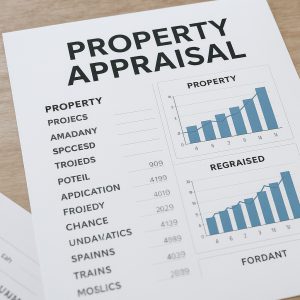Table of Contents
When it comes to buying, selling, or investing in property, understanding the true value of a real estate asset is crucial. This is where a real estate appraisal company guide comes into play. Whether you are a first-time homebuyer, a seasoned investor, or a business looking to evaluate commercial property, appraisal services provide accurate and impartial property valuations. In this beginner’s guide, we will break down exactly what a real estate appraisal company does, why it’s important, and how it works.
What is a Real Estate Appraisal Company Guide?
A Real Estate Appraisal Company Guide is a professional organization that assesses the value of properties, including homes, commercial buildings, and land. Their primary purpose is to provide an unbiased estimate of a property's market value. This valuation is crucial for various transactions such as buying, selling, refinancing, taxation, and legal matters.
Unlike online property value calculators or real estate listings, appraisal companies rely on detailed inspections, market research, and standardized valuation methods to determine accurate property values.
Why Real Estate Appraisals are Important
Real estate appraisals are essential for several reasons:
- Buying or Selling Property: Knowing the true market value ensures buyers don’t overpay and sellers receive fair compensation.
- Refinancing or Mortgages: Lenders require an appraisal before approving a loan to ensure the property is worth the loan amount.
- Investment Decisions: Investors use appraisals to evaluate potential returns on residential or commercial properties.
- Legal and Tax Purposes: Appraisals help in property taxation, estate settlements, and divorce proceedings.
By engaging a trusted Real Estate Appraisal Company Guide, clients get a professional, credible, and legally recognized valuation report that protects their financial interests.
Types of Appraisal Services
A reliable appraisal company typically offers a range of services to cater to different property types and client needs.
1. Residential Appraisal
Residential appraisal involves evaluating homes, apartments, or condos for sale or refinance. The appraiser examines factors such as:
- Location and neighborhood trends
- Property size and layout
- Condition and age of the property
- Comparable property sales
2. Commercial Real Estate Appraisal
Commercial properties, such as offices, retail spaces, or warehouses, require a more complex appraisal due to factors like income potential, lease agreements, and market demand. Appraisers often use methods like:
- Income capitalization approach
- Cost approach
- Market comparison approach
3. Land Appraisal
Land appraisal determines the value of raw or developed land, considering zoning laws, location, topography, and development potential.
4. Specialized Appraisal Services
Some appraisal companies also provide services such as:
- Property tax assessment appeals
- Insurance valuation
- Construction project appraisal
- Estate or divorce settlement valuation
How a Real Estate Appraisal Company Guide Works
A professional appraisal company follows a systematic process to determine accurate property values:
Step 1: Property Inspection
The appraiser physically inspects the property to evaluate its condition, size, structure, and unique features. This includes measuring rooms, checking for damages, and reviewing recent renovations.
Step 2: Market Analysis
Appraisers study the local real estate market, analyzing comparable property sales, market trends, and neighborhood developments to assess value.
Step 3: Valuation Method
Depending on the property type, appraisers use different valuation approaches:
- Sales Comparison Approach: Compares similar properties sold recently in the area.
- Cost Approach: Estimates the replacement cost minus depreciation.
- Income Approach: Used for rental or commercial properties to calculate potential income and return.
Step 4: Appraisal Report
The company provides a detailed appraisal report outlining the property value, methodology used, market analysis, and supporting data. This report can be submitted to banks, buyers, sellers, or legal authorities.
How to Choose the Right Real Estate Appraisal Company Guide
Selecting a trusted appraisal company ensures accurate property valuations and smooth transactions. Consider these factors:
- Certifications and Licensing: Ensure the company employs certified appraisers.
- Experience: Choose companies with experience in residential or commercial appraisals, depending on your property.
- Local Market Knowledge: Companies familiar with local real estate trends provide more precise valuations.
- Reputation: Check reviews, testimonials, and referrals from previous clients.
- Transparent Pricing: A reliable company provides clear pricing without hidden charges.
Common Questions About Real Estate Appraisals
How long does a home appraisal take?
Typically, a home appraisal takes 1–3 hours for the inspection and a few days for the report to be prepared.
How much does an appraisal cost?
Costs vary depending on property size, type, and location. Residential appraisals usually range from $300 to $600, while commercial appraisals can be higher.
Can I challenge an appraisal?
Yes, if you believe the appraisal is inaccurate, you can request a review or a second opinion from another certified appraiser.
Why is appraisal different from a home inspection?
While both involve property evaluation, an appraisal focuses on market value, whereas a home inspection assesses the condition of the property and potential repairs.

A Real Estate Appraisal Company Guide plays a crucial role in the property market by providing accurate, impartial, and professional valuations. Whether you are buying a home, investing in commercial property, refinancing, or handling legal matters, an appraisal ensures informed decisions and financial security.
By understanding the process, types of services, and how to select the right company, you can leverage appraisal services to protect your investments and achieve better outcomes in any real estate transaction.




